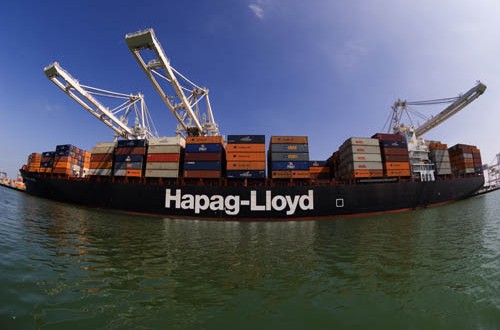forum
library
tutorial
contact

Port of Portland's Container Terminal
Needed to Keep Costs Low at Bigger Ports
by Staff
Hellenic Shipping News, April 6, 2015
|
the film forum library tutorial contact |

|
Port of Portland's Container Terminal
by Staff
|
 The Port of Portland's container terminal never really competed with other West Coast ports when it came to volume of containers moved or size of population served. In 2014, it was about 1 percent of the West Coast business. By pretty much any measure, Portland's Terminal 6 has always been an inconsequential player in the overall movement of cargo containers to and from the west coast.
The Port of Portland's container terminal never really competed with other West Coast ports when it came to volume of containers moved or size of population served. In 2014, it was about 1 percent of the West Coast business. By pretty much any measure, Portland's Terminal 6 has always been an inconsequential player in the overall movement of cargo containers to and from the west coast.
But without it, exporters in the region are increasingly at the mercy of the pricing at larger ports in California and the Puget Sound.
"Having a container terminal that functions doesn't mean it has to carry everything," said Sebastian Degens, general manager of Port of Portland's marine operations. "It can be a price spoiler for everyone else."
During a Tuesday panel discussion involving agriculture and port officials, Degens said farmers and other agriculture companies -- which collectively made up about half of the container terminal's exporting customers in recent years -- will struggle the most to absorb increased costs to ship their fruits, grass seed and processed products overseas.
Hanjin Shipping Co., Portland's direct link to most Asian countries, stopped sending ships to the container terminal in February, following years of discord locally and months of West Coast-wide contract negotiations between port operators and the International Longshore and Warehouse Union.
Hanjin ships accounted for nearly 80 percent of Terminal 6's business, and it was the only shipping line taking Oregon goods straight to some of the state's biggest customers, such as China and South Korea.
Within days of the announcement that Hanjin would stop service, agriculture companies began looking for new options. Hanjin now operates a rail service between Portland and Seattle. The other option is trucking north or south.
Oregon Department of Agriculture Director Katy Coba said Tuesday that Portland's container-port problems are probably a gift to the Port of Tacoma, which is likely absorbing much of Portland's former business.
For exporters, though, every mile trucked comes with a price.
"We in agriculture were really, really negatively impacted by the port slowdown," Coba said.
A fix is likely still years away, and dependent on a resolution to the fighting between port operator ICTSI Oregon and the local longshore workers.
It will also likely take branding -- convincing businesses and shipping companies that Portland is a gateway to a market bigger than the city's population.
Portland is 100 miles up the Columbia River from the ocean, which limits the amount of ships that can call at the port. And the urban hub is smaller than the rest of the major West Coast ports.
"We're a somewhat remote, niche port that has to provide competitive services to remain viable," Degens said.
The port's grain terminal is one of the leaders in the country, which is what the Port of Portland was built for. The container terminal, on the other hand, has always struggled -- losing money almost every year under Port of Portland authority, and later under ICTSI Oregon.
Officials and regional exporters Tuesday said they think it's still worth saving, though.
"I think we want the Port of Portland to be a viable opportunity," Coba said.
Related Pages:
Port Extends Ocean Carrier Subsidies by Mateusz Perkowski, Capital Press, 12/10/14
Lewiston Container Shipping Fact Sheet, 1997, by Port of Lewiston
Portland Container Shipping Fact Sheet, 2002, by Port of Portland
learn more on topics covered in the film
see the video
read the script
learn the songs
discussion forum
